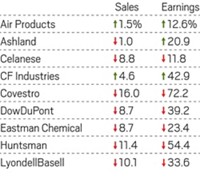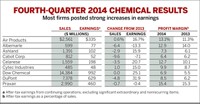Advertisement
Grab your lab coat. Let's get started
Welcome!
Welcome!
Create an account below to get 6 C&EN articles per month, receive newsletters and more - all free.
It seems this is your first time logging in online. Please enter the following information to continue.
As an ACS member you automatically get access to this site. All we need is few more details to create your reading experience.
Not you? Sign in with a different account.
Not you? Sign in with a different account.
ERROR 1
ERROR 1
ERROR 2
ERROR 2
ERROR 2
ERROR 2
ERROR 2
Password and Confirm password must match.
If you have an ACS member number, please enter it here so we can link this account to your membership. (optional)
ERROR 2
ACS values your privacy. By submitting your information, you are gaining access to C&EN and subscribing to our weekly newsletter. We use the information you provide to make your reading experience better, and we will never sell your data to third party members.
Business
Demand Collapses In Fourth Quarter
Chemical executives rue the worst quarter in decades
by Melody Voith
February 9, 2009
| A version of this story appeared in
Volume 87, Issue 6
IN JUST ONE QUARTER, U.S. chemical industry earnings went from mixed to miserable. The prevailing tone from company executives has been one of shock and dismay at the disappearance of demand during the fourth quarter.
At Dow Chemical, the unraveling economy resulted in a 23.4% decrease in sales during a very difficult time for the firm. Even excluding a restructuring charge of $628 million, the company had a loss of $574 million compared with earnings of $805 million in the same quarter a year earlier.
In a conference call with analysts, CEO Andrew N. Liveris reported on "one of the worst quarters we have seen in more than two decades." Like many industry leaders, he pointed to outside factors. "The rapid demand destruction and unprecedented destocking throughout almost every value chain is something none of us has ever experienced," Liveris said. "The impact of this global economic correction in the fourth quarter was inescapable."
Also inescapable is the fact that Dow will not be able to earn its way into its purchase of Rohm and Haas, a deal which has been put on hold and is now the subject of litigation (see page 9). Liveris acknowledged that the firm is looking at selling one or more of 12 businesses, including Dow AgroSciences, its only business to see sales increase in the fourth quarter.
The economic crisis has hit almost all sectors and regions of the chemical industry except agriculture. High demand for food and fuel crops meant that Mosaic was able to continue to raise fertilizer prices and increase its earnings by 143.7% in the fourth quarter.
Nalco saw strong earnings growth of 70.3% on the power of its energy services division. However, the company took a $544 million noncash impairment charge on its paper services business, which saw large sales declines in the quarter.
Eastman Chemical's 22.5% sales decline was similar to Dow's. Unlike at Dow, recent cost-cutting moves at Eastman kept earnings positive, although it earned only $4 million, compared with $103 million in the fourth quarter of 2007. "The world changed pretty dramatically beginning in November, when demand dropped as rapidly as I've ever seen it," CEO J. Brian Ferguson reported in a call to analysts.
Capacity utilization at Eastman was as low as 50% in December, Ferguson said. The company's performance polymers, performance chemicals, and intermediates suffered from lower sales volumes, falling prices, and higher unit costs from running facilities at such low capacity.
Chemical firms were almost all in the same boat in the fourth quarter, according to Laurence Alexander, a chemical stock analyst at Jefferies & Co. "October was poor to middling for most companies," he says. "In November, you started to see these extended shutdowns, meaning customer facilities were not taking on inventory. In December, demand just shut off."
Alexander divides the chemical industry into two camps: those that started cutting costs early and those that resisted. "Many firms pushed back," he says. "There was some willful stubbornness that exacerbated the drop-off."
Praxair was one of the aggressive cost cutters, Alexander says. In fact, the industrial gases firm was able to hold on to earnings, seeing only a 0.6% decline for the quarter, even though sales fell 4.8%. The firm began restructuring in the third quarter, anticipating demand would decline because of the economic crisis.
DuPont executives also focused on quickly preserving the firm's strong balance sheet. New CEO Ellen J. Kullman told analysts in a conference call that "we established cash as our primary objective and intensified our actions to drive for cash, productivity, and efficiency." Despite those efforts, the company posted a loss of $249 million for the quarter, not including a restructuring charge of $535 million.








Join the conversation
Contact the reporter
Submit a Letter to the Editor for publication
Engage with us on Twitter